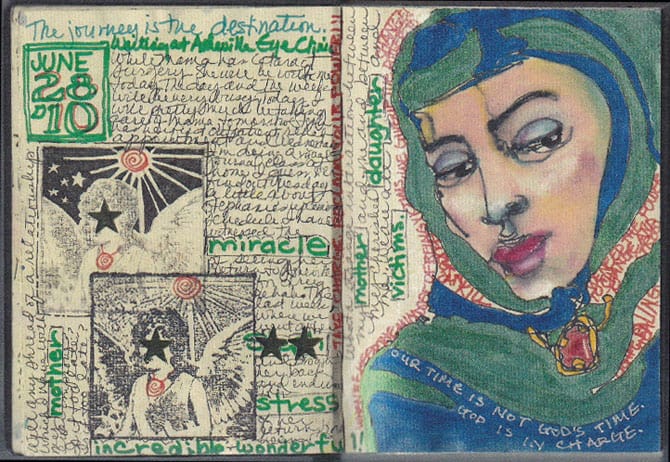 |
| Mary Alice Ramsey http://www.maryaliceramsey.com/news/ |
Visual Journaling and Mixed Media Monday - You will learn a mixed media technique each week that you can apply to your work.
Requirements -
- Research the word and write the definition in your own words in your visual journal.
- Create a visual representation of the concept on 2 pages(open your journal)
- Cover the pages with imagery/artwork
- Do not just copy off the internet or from other artist-create your own work
- Use at least 2 art mediums to create the work.
Essential Questions:
How do different cultures manifest the purposes of art?
Standard: IObserve and Learn to Comprehend
2. Art and design have purpose and function
Content Objective:
Students will learn the elements and principles of art
Language Objective:
Students will research and create a visual representation of vocabulary
Check List -
- Research the word/concept and write the definition in your own words in your visual journal.
- Create a visual representation of the concept on 1- 2 pages(open your journal)
- Cover the pages with imagery/artwork
- Do not just copy off the internet or from other artist-create your own work
- Use at least 2 art mediums to create the work.
 |
| http://portfolios.risd.edu/gallery/22504431/Drawing-Space-with-Light |
Sept. 17th - Mixed Media Monday Assignment
Word of the Week - Form
Technique #3: Charcoal
"Visual journaling is a creative way to express and record life's experiences, feelings, emotional reactions, or our inner world - visually and verbally. Essentially, visual journaling can become a potential key to the art-making process that helps you develop your own voice.
Exploring our own thought process through visual journaling is essential in a world that is in a state of continuous change. Just as there are many ways to express oneself artistically, there are many ways to create visual journals. By committing to the visual journaling process, one can learn how to access his/her inner language of imagery and express it both visually and verbally, while exploring the connection between image and word. Through visual journaling one can also become capable of articulating connections between their own personal art-making experiences and the works of master and contemporary artists."
Michael Bell Celebrity Artist www.mbellart.com
|
“At the beginning of any new idea, the possibilities can seem infinite, and that wide-open landscape of opportunity can become a prison of anxiety and self-doubt.” ---Peter Sims
http://www.createmixedmedia.com/make/art-journal-inspiration-open-up-your-journal-and-play
How is your Visual Journal Graded?
Your Visual Journals are graded on a four point rubric you can see below. I grade on the following criteria:
Composition and Neatness- Your Journal page is well balanced and filled and the artwork has an emphasis or focus. The paper is neat and clean.
Techniques - You've experimented with 3 to 4 different mediums, (watercolor, pencil, charcoal, colored pencil, pastel, collage, transfer images, pen and ink, marker)
Meaning Making - You've expressed an ideas or opinion is a creative way. Your artwork shows mark-making or design that reflex your ideas.
Visual Journal Rubric
One Visual Journal page will be due
every week. These can be worked on
during class when daily assignments are complete.
Course: Foundations of art
Standard: Relate and Connect to
Transfer
Communicate through advanced visual
methods in everyday life.
|
4 Advanced Understanding of the Standard |
3
Meets the Standard |
2
Approaches the Standard |
1 Does Not Meet the Standard |
Evidence Outcome:
Use sketches, plans, and models to create and/or design a
functioning work of art.
|
The Visual
Journal entry is exceptional; creative, skillful, unique and high levels of
craftsmanship are apparent. The images are original using only your designs. Writing is clearly evident and abundant.
More than 1 hour of obvious time and care was put into the construction of
the page. It is visually strong and expressive and contains a lot of
contrast. You’ve experimented with more that one medium.
|
Proficient/satisfactory care, craftsmanship and skill shown in your
practice. The
entry is above average. The image is mostly original with some logos or
cliché designs. Writing is evident but there isn’t a lot. At least 1 hour of
time and care was put into the construction of the page. It is visually strong
and expressive. It includes different
mediums/materials.
|
Developing care, craftsmanship and skill shown in your practice. The entry is average. It
is somewhat original; however, logos and cliché designs are included. Writing
is evident but not overwhelming. Less
than 45 minutes of time and care was put into the construction of the page.
It is visually expressive but not a lot of contrast.
|
Beginning care, craftsmanship and skill shown in your practice. The entry is below
average. The image is not original. Writing is nonexistent or very little of
it. Little to no time and care was put
into the construction of the page. It is visually lacking in contrast and
expressiveness
|

